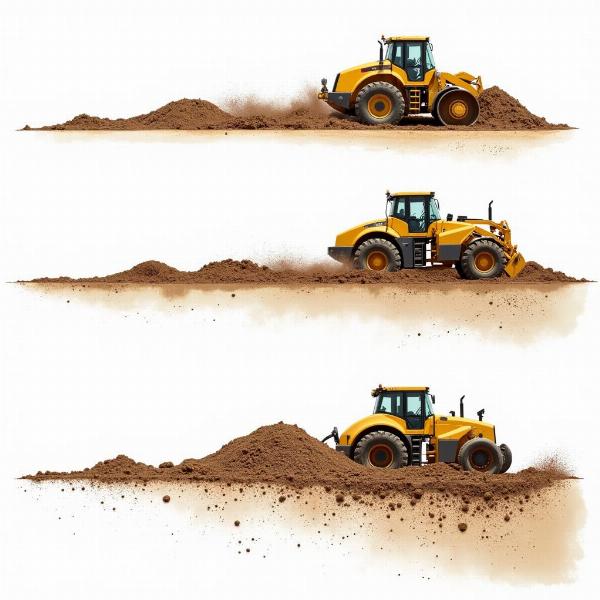Compaction, a term frequently encountered in construction, engineering, and even agriculture, refers to the process of densification of a material by reducing its porosity. Understanding the meaning of compaction in Hindi is crucial for effective communication in these fields within India. This article explores the various aspects of compaction, its significance, and its Hindi translations.
What Does Compaction Mean?
Compaction involves applying mechanical force, such as pressure or vibration, to a material, typically soil, aggregate, or concrete, to decrease the volume of air or void spaces within it. This process increases the material’s density and improves its mechanical properties, such as strength, stability, and resistance to water penetration.
 Soil Compaction Process
Soil Compaction Process
Compaction Meaning in Hindi: विभिन्न अर्थ और संदर्भ
The Hindi translation of “compaction” can vary depending on the context. Here are some common translations:
- संपीडन (Sampīḍan): This is the most common and general term for compaction. It literally means “compression” and can be used in most contexts.
- ठोसकरण (Ṭhoskaraṇ): This term emphasizes the solidification aspect of compaction, making it suitable for contexts where the material becomes harder or more solid.
- घनीकरण (Ghanīkaraṇ): This word refers to the densification process, making it particularly appropriate for discussions about increasing the density of a substance.
- दृढ़ीकरण (Dṛḍhīkaraṇ): This term highlights the strengthening aspect of compaction, often used when the process enhances the material’s stability and load-bearing capacity.
Why is Compaction Important?
Compaction plays a vital role in numerous applications:
- Construction: Compacting soil provides a stable foundation for buildings, roads, and other infrastructure. It minimizes settling and prevents structural damage.
- Agriculture: Soil compaction affects root growth and water infiltration, influencing crop yields.
- Landfills: Compacting waste reduces volume and minimizes environmental impact.
- Pharmaceuticals: Compaction is used in tablet manufacturing to ensure consistent dosage and stability.
Different Types of Compaction
Various compaction methods exist, each suited for specific materials and applications:
- Static Compaction: Applies a constant pressure to the material.
- Vibratory Compaction: Uses vibrations to rearrange particles and reduce voids.
- Impact Compaction: Employs repeated blows to compact the material.
- Kneading Compaction: Uses a kneading action to densify clay soils.
How to Achieve Effective Compaction?
Several factors influence compaction effectiveness:
- Moisture Content: Optimal moisture content is essential for effective compaction.
- Compactive Effort: The amount of energy applied during compaction affects the final density.
- Soil Type: Different soil types require different compaction techniques.
- Layer Thickness: Compacting thin layers ensures uniform density.
What Happens if Compaction is Inadequate?
Insufficient compaction can lead to several problems:
- Settlement: Uneven settling can cause structural damage.
- Erosion: Loose soil is more susceptible to erosion.
- Reduced Permeability: Poor compaction can hinder water drainage.
Conclusion: Understanding Compaction is Key
Understanding the meaning and significance of compaction, whether in English or Hindi (संपीडन – Sampīḍan), is vital for various industries. Proper compaction ensures the stability, strength, and longevity of structures, contributing to safer and more efficient practices across diverse fields.
FAQs
- What is the most common Hindi word for compaction? संपीडन (Sampīḍan) is the most frequently used term.
- Why is compaction important in construction? Compaction provides a stable foundation, preventing settlement and structural damage.
- How does compaction affect agriculture? It influences soil structure, affecting root growth and water infiltration, impacting crop yields.
- What are the different types of compaction? Static, vibratory, impact, and kneading are common compaction methods.
- What factors influence compaction effectiveness? Moisture content, compactive effort, soil type, and layer thickness are key factors.
- What problems can arise from inadequate compaction? Settlement, erosion, and reduced permeability are potential consequences.
- Where can I find professional Hindi translation services for technical documents related to compaction? Contact Meaning-Hindi.in for accurate and reliable translation services.
Meaning-Hindi.in: Your Trusted Partner for Hindi Translations
Meaning-Hindi.in is a leading provider of Hindi translation services, specializing in various fields, including business, legal, technical, website localization, and academic translations. We offer high-quality, culturally sensitive translations to bridge the communication gap between languages. Whether you need to translate documents about compaction, construction, or any other specialized field, our team of expert linguists ensures accuracy and fluency. Contact us today for a free quote via email at [email protected] or phone at +91 11-4502-7584. Let Meaning-Hindi.in be your partner for all your Hindi translation needs.